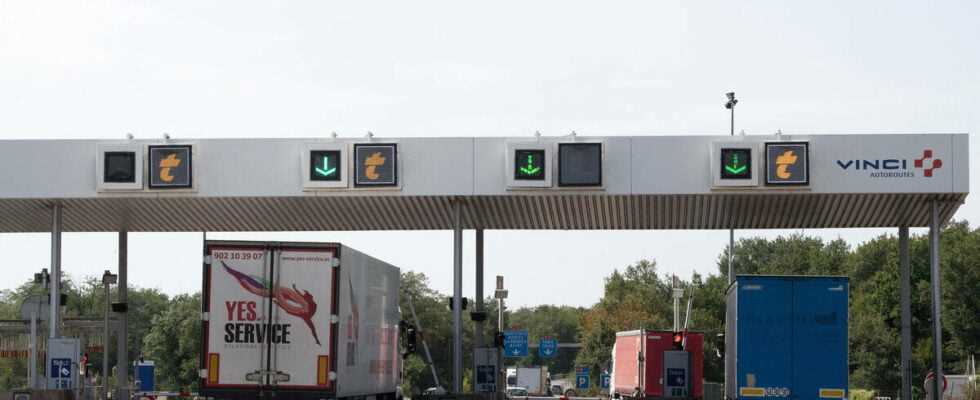After gasoline, tolls. Some motorists will see their bills increase a little more from Tuesday. The tolls of the motorway networks will indeed increase on average by 1.89%, according to decrees published on Sunday in Official newspaper. The contracts that bind the motorway companies to the State provide for an automatic increase in prices every year on February 1. And inflation and the construction sites undertaken on the network are the main fuels for these increases. But this 1.89% increase is well above inflation in France (1.6% in 2021 according to INSEE), at its highest level since 2018.
This average figure also hides disparities depending on the networks and types of journey. In detail, for cars, prices will increase by 1.89% on the Cofiroute network (Centre-Ouest, A10 from Paris to Poitiers, A11, etc.), 2.19% on the motorways in the south of France (ASF ), 1.91% on Sanef (North and North-East), 2.12% on most of the SAPN network (Normandy) or 2.05% on APRR (A6 and Central-East motorways) as well as on Escota (South East). Increases which then follow that which took place at the start of 2021 (0.44%).
In addition to the motorways, other toll places will also be affected, such as the Normandy bridge, the price of which will take 10 cents for classic cars, or the Sainte-Marie-aux-Mines tunnel (Haut-Rhin), which will see its prices increase by 10 to 50 cents depending on the vehicle.
Increases on a “case by case” basis
In an attempt to avoid the outcry, Vinci, France’s leading motorway concession group, whose network includes ASF, Cofiroute and Escota, promised a “tariff break” on four-fifths of journeys of less than 30 km, two-thirds of journeys of less than 50 km and routes bypassing 34 agglomerations. “To preserve the purchasing power of motorists, toll rates for the vast majority of short-distance journeys will not increase on the Vinci Autoroutes network in 2022”, tried the multinational.
On average, Vinci toll rates will still increase in 2022 by 2%. “We made sure to apply the contracts [liant les sociétés à l’Etat, ndlr], which means that we have an average increase of 2%. We worked to ensure that[…]a maximum of motorists benefit from journeys which do not increase”, assured a spokesperson for the group, who however refused to conclude that the tolls would increase more on long routes, to compensate for the freezing of daily journeys. “It’s case by case,” he insisted.
These announcements come in the middle of the presidential campaign, which sees the candidates express themselves on the subject. In the JDD, Valérie Pécresse’s adviser, Hervé Morin, explained on Sunday that“we [pouvait] postpone such a decision when the question of purchasing power has become central”. Several candidates such as Jean-Luc Mélenchon, Fabien Roussel or even Marine Le Pen, are proposing the nationalization of the motorway network. No question for the government. “It’s 40 billion that will be spent, whereas if we wait ten or fifteen years, we can recover these highways for 0 euro”, explained Bruno Le Maire in September, before comparing this idea to the “Tito’s Yugoslavia”.
The contracts signed in 2006 are considered harmful to the state even in the ranks of the right, yet in power at the time. “The contracts which bind the State and the concessionaires were established on bases which were not very equitable. They clearly favor dealers to the detriment of the State, in other words the general interest and motorists,” castigated in 2019 the deputy LR Marine Bernier, author of a motion for a resolution requesting the creation of a parliamentary commission of inquiry on the privatization of motorway concessions.
Diesel at 1.67 euros per litre, SP95 at 1.72 euros
On the gasoline front, increases are also continuing, against a backdrop of the global energy price crisis. This Monday, the average fuel prices in France published by the Ministry of Energy Transition increased for the fifth consecutive week. Diesel reached 1.67 euro per liter (1.6 cents more than last Monday) and SP95 1.72 euro (+2.1 cents in seven days).
In order to respond to a price of a barrel of Brent which came close to 90 dollars on Monday morning, a bar which it exceeded last week for the first time since 2014, the OPEC + cartel has planned to meet on Wednesday to discuss a further increase in production. Many analysts are expecting a further increase in the total production volume of 400,000 barrels per day for the month of March. Decisions that could limit increases.
This rise in prices is particularly worrying overseas, where the question of purchasing power is even more sensitive given the high cost of living. The government indicated on Friday that a mission on the regulation of fuel and gas prices in the departments concerned had been entrusted to the General Inspectorate of Finance in order in particular to“questioning the current pricing model”.
The mission will focus in particular on Guadeloupe, Martinique and Guyana where the Sara company holds a historic monopoly on refining, said a press release. The mission will also question “the relevance of the current pricing model in the context of the energy transition” and its first results are expected at the end of March.
The government is trying to stem a problem that could poison the start of the outgoing president’s campaign, as purchasing power becomes a major campaign issue. No question of asking motorway companies for a 30% reduction in prices for regular drivers – what the executive had obtained in early 2019, in the midst of a challenge to yellow vests. Jean Castex, on the other hand, announced last week the increase of 10% in the scale of the mileage allowance. Not enough to stem the fears of French people who, for many, do not choose their means of transport and fear seeing the symbolic bar of 2 euros exceeded, for gasoline… and perhaps even diesel.
